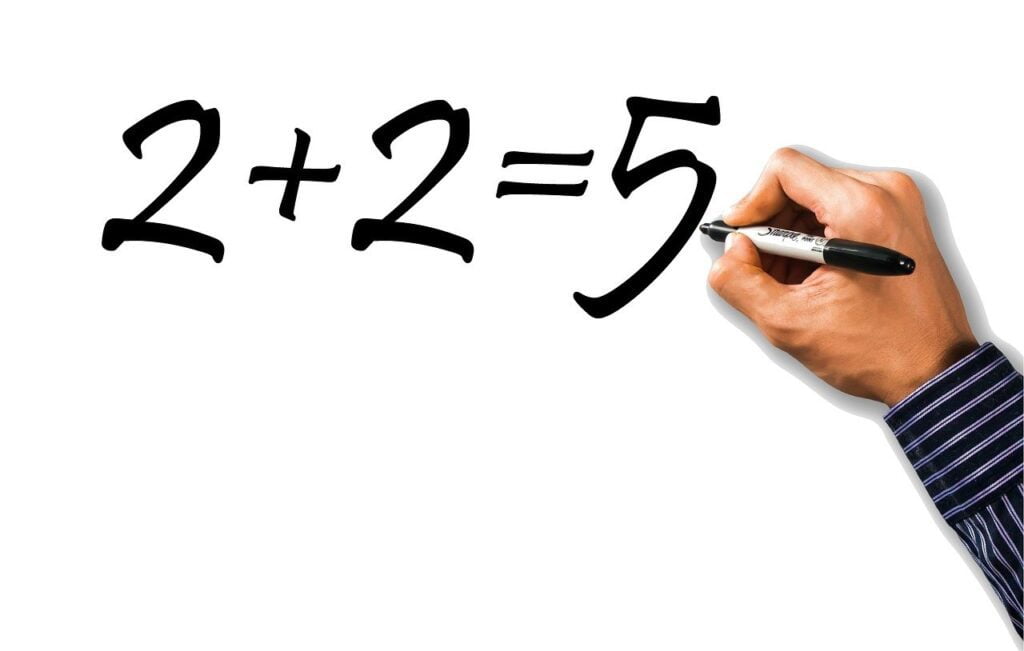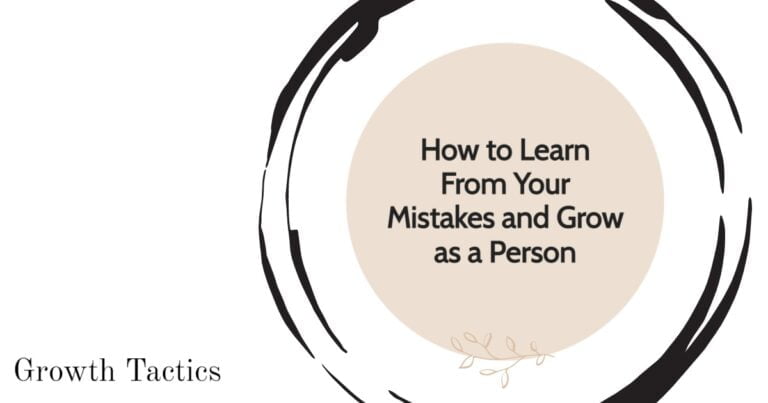If you’re like most people, then you’ve made a lot of mistakes in your life. You’ve taken wrong turns, made bad decisions, and failed to act on opportunities. And when these things happen, and they will, how can you use them to grow? In this article, we will discuss how to learn from your mistakes and reframe them into growth opportunities.
Jump To Section
Take responsibility for your part in the situation.
“We are products of our past, but we don’t have to be prisoners of it.”
― Rick Warren, The Purpose Driven Life: What on Earth Am I Here for?
When you make a mistake, it’s important to take responsibility for your part in the situation. This can be difficult, as it’s often easy to blame others or the situation for your mistakes. But taking responsibility is a crucial step in learning from your mistakes and moving forward.
It’s also important not to blame others or the situation for your mistakes, as this will keep you stuck in negative thoughts and feelings that won’t help you improve.
Here are some tips on how to take responsibility:
- Admit that you made a mistake. This may seem obvious, but sometimes we’re so focused on blaming others or the situation that we forget this simple step!
- Acknowledge that only you can change what happened. No one else can do it for you.
- Make sure all parties understand their role in what happened, so everyone can learn from what happened and move forward as a team!

Give yourself time to recover.
Don’t rush into trying to learn from it and move on. This is the time when you’ll benefit the most by understanding exactly what happened and why. You may have made the same mistake before, but something was different this time that led to an even worse outcome. Or maybe there was something in particular about the situation that caused things to go awry that wouldn’t be relevant in other situations, like working with a new team member or having limited resources available at work.
In any case, take some time out of your day for self-reflection! Even if it’s just for five minutes each day where you sit down and think about how things went wrong and why it happened so that next time around when something similar happens again (and believe me, it will), then you’ll have a better idea of how to react effectively as well as prevent any further mistakes from occurring again too often than necessary.”
Think about what you can learn from the Mistake.
“The only real mistake is the one from which we learn nothing.”
Henry Ford
Read more at https://www.yourfates.com/learning-from-mistake-quotes-and-sayings/
The next step in learning from your mistakes is to examine what happened and why. Look at what went wrong and how it could have been prevented. If you find yourself asking “why?” too often, try turning the question around on yourself. Think about what you should do differently next time, or how you might prevent this mistake from happening again in the future.
If there are no clear answers, or if no one else could have done things differently, then take this as an opportunity to reflect on yourself, instead of blaming others for your failure or shortcomings. If someone else made a mistake that led to a bad outcome, ask yourself whether there was anything different you could have done at any point before or during the event that would have led to a better result.
Talk it out and find a solution.
Once you’ve identified the mistake, you should talk about it. The best way to do this is by talking to the person involved. You can also talk to a friend or family member, or even a therapist, coach, mentor, or teacher. Another option is to go straight to your boss or coworker if they are not involved in the situation directly but have some knowledge of what happened and how it could have been handled differently.
In this discussion (which should be held as soon after the incident as possible), explain what happened and how you feel about yourself now that things have settled down a bit. Ask them for their perspective on what happened.
Recognize what you did right or did well, or what other people did right or did well.
It is important to recognize your mistakes and learn from them. However, it is equally important to recognize that you have done some things right in your life. Even if they are small things, they are still good things that need recognition. The same goes for recognizing the good things that other people have done in their lives.
This can be difficult because we tend to focus on our mistakes more than anything else. But by doing this, we also miss out on all of the good things that we did.

Commit to doing better next time.
“Mistakes are the usual bridge between inexperience and wisdom.”
Phyllis Theroux
When we make mistakes, we can either let them stop us in our tracks or we can use them as opportunities to learn and grow. Make sure you’re doing the latter!
If you’ve had a setback or two, commit to doing better next time. When learning from your mistakes, commit yourself to do things differently in the future. Do what you can now so that the same problems don’t happen again!
See Related: Create an Individual Development Plan in 5 Easy Steps for Massive Personal and Professional Growth
Look at the mistake with a different mindset
When you’re reflecting on a mistake, it can be helpful to look at it with a different mindset. Instead of focusing on the negative aspects of what happened and how it could have been prevented, look for the positive aspects of your mistake.
Here are some questions you can ask yourself when looking back at an error:
- What did I learn from this situation?
- How did I grow from this experience?
- Will this help me make better decisions in the future?
Monitor your progress over time
If you want to learn from your mistakes, then it’s important that you monitor your progress over time. This can be as simple as setting goals for yourself and tracking your progress against them.
You might also want to consider using a journal or diary to record the details of each day. This can serve as a convenient resource for when you need to remember what happened the last time you tried something new, but it will also help you identify patterns in your behavior that may not be obvious at first glance.
See Related: How to Write SMART Goals (Definition and Examples)
Mistakes happen and that’s okay, as long as you use them as opportunities to learn and grow.
Mistakes happen, and that’s okay. As long as you use them as opportunities to learn and grow, mistakes can be beneficial.
The Science Behind Learning From Your Mistakes
There’s actually some solid science behind this age-old advice. Let’s explore how and why this works.
Our Brain’s Role
When you make a mistake, your brain doesn’t just shrug it off. Instead, it jumps into action. Specifically, a part of your brain called the prefrontal cortex gets involved. This area helps you plan and control your behavior. When you slip up, your prefrontal cortex reflects on what went wrong and how to fix it next time.
The Feedback Loop
Every time you make a mistake, you receive feedback, either from yourself or others. This feedback is crucial; it informs you about what didn’t work. Think of it like playing a video game. When you fail a level, you don’t just start over blindly. You use what you learned from your failure to navigate the level better next time. Similarly, this feedback helps you tweak your actions and improve.
Emotional Impact
Mistakes often come with emotional baggage – frustration, embarrassment, or even disappointment. But guess what? These emotions serve a purpose too. They make your brain pay closer attention. When you feel bad about an error, your brain makes an extra effort to avoid repeating it. So, while those feelings aren’t pleasant, they’re a big part of the learning process.
Building Resilience
Lastly, learning from mistakes builds resilience. Mistakes teach you that failure isn’t the end but a step on the way to success. They help you develop a growth mindset, which means you believe you can get better with effort. With each mistake, you become more adaptable and find new solutions to problems.
Conclusion
I hope you’ve learned something about learning from your mistakes. Now, keep these tips in mind next time you make a mistake and you’ll be better off than before. Just remember that we all make mistakes and that it’s how we respond to them that matters most!
Did you enjoy this article on learning from mistakes? Please share and subscribe below.


